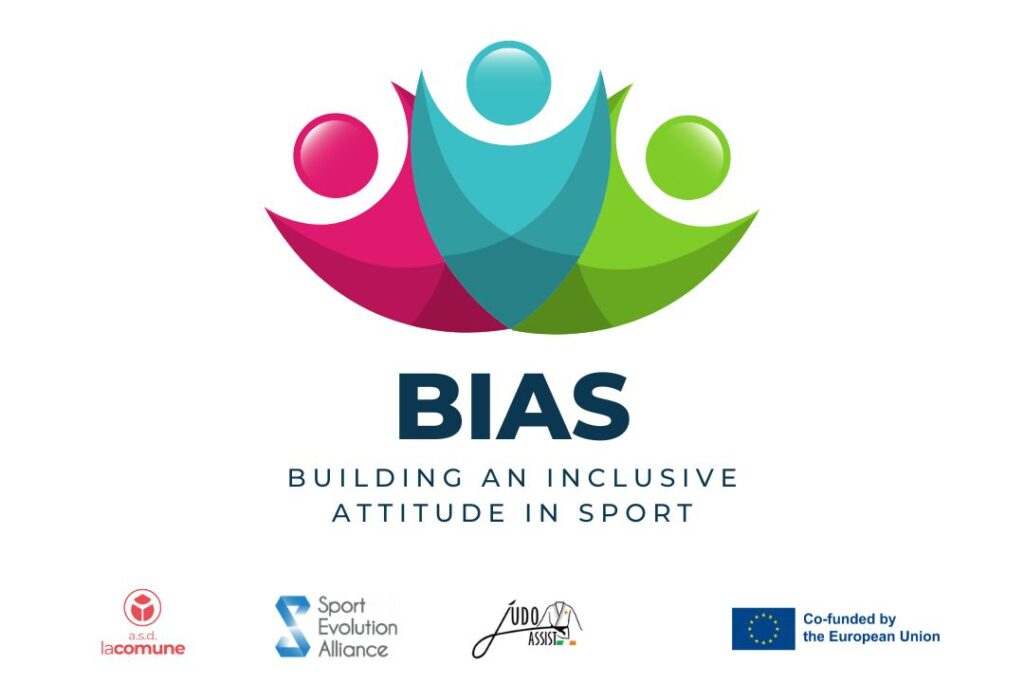Inizia la parte operativa del progetto BIAS, il progetto internazionale finanziato dall’Unione Europea*: il primo incontro sarà il 1° febbraio con una riunione in Portogallo tra i 3 partner in cui si condivideranno le metodologie e i contenuti da sviluppare insieme nei mesi successivi.
I 3 partner del progetto, ASD La Comune (Italia), Judo Assist Ireland (Irlanda) e Sport Evolution Alleance (Portogallo), nei prossimi mesi saranno coinvolti in gruppi di studio e di confronto, sia attraverso videoconferenze, sia con trasferte in Irlanda e Portogallo, durante i quali i maestri dei tre paesi si incontreranno per sperimentare pratiche inclusive aperte alle famiglie, ai bambini normodotati e a quelli con disabilità.
Lo scopo di queste pratiche è creare un ambiente sportivo veramente inclusivo in cui i bambini con disabilità intellettiva o disturbi dello spettro autistico possono sperimentare i benefici dell’attività fisica, dell’interazione sociale e della crescita personale.
I PRINCIPI CHIAVE DEL PROGETTO BIAS
Il progetto BIAS mira a sperimentare delle pratiche inclusive nello sport da integrare nei gruppi in cui sono presenti uno o più bambini con disabilità e far divenire queste pratiche un modello per gli insegnanti, gli allenatori, i genitori che sono o saranno coinvolti.
Per arrivare all’obiettivo i 3 partner hanno deciso di adottare un approccio alla disciplina sportiva basato sul bambino e sulle sue reali esigenze, proponendo attività e materiali accessibili a tutti e aumentando le difficoltà gradualmente e solo quando il gruppo nella sua totalità dimostra di essere pronto. Sarà fondamentale anche che l’istruttore incoraggi l’interazione tra i bambini e la collaborazione per promuovere un senso di appartenenza e di comunità.
Siamo entusiasti di iniziare concretamente questo progetto e di condividere pratiche e idee che possano essere uno spunto per il nostro e altrui lavoro con i bambini nello sport.
*Finanziato dall’Unione europea. Le opinioni espresse appartengono, tuttavia, al solo o ai soli autori e non riflettono necessariamente le opinioni dell’Unione europea o dell’Agenzia esecutiva europea per l’istruzione e la cultura (EACEA). Né l’Unione europea né l’EACEA possono esserne ritenute responsabili.
ENGLISH VERSION
Bias – Building an Inclusive Attitude in Sports
The operational part of the BIAS project, the international project financed by the European Union*, begins!
The first meeting will be on the 1st of February in Portugal between the 3 partners in which it will be the opportunity to share the methodologies and contents to be developed together in the following months.
The 3 project partners, ASD La Comune (Italy), Judo Assist Ireland (Ireland) and Sport Evolution Alliance (Portugal), will be involved in study and comparison groups in the coming months, both through videoconferences and in presence in Ireland and Portugal, during which the trainers and coaches of the three countries will meet to experience inclusive practices open to families, able-bodied children and those with disabilities.
The purpose of these practices is to create a truly inclusive sports environment where children with intellectual disabilities or Autism Spectrum Disorder can experience the benefits of physical activity, social interaction and personal growth.
THE KEY PRINCIPLES OF THE BIAS PROJECT
The BIAS project aims at experimenting inclusive sport practices to be integrated in groups in which one or more children with disabilities are present in order to make these practices a model for teachers, coaches, parents who are or will be involved.
To reach the goal the 3 partners decided to adopt an approach to the sport based on the child and their real needs, proposing activities and materials accessible to all and increasing the difficulties gradually and only when the group as a whole proves to be ready. It will also be crucial that the instructor encourages interaction between children and collaboration to promote a sense of belonging and community.
We are excited to start this project concretely and to share practices and ideas that can be an inspiration for us and for others who work with children in the field of sport.
*Funded by the European Union. Views and opinions expressed are however those of the author(s) only and do not necessarily reflect those of the European Union or the European Education and Culture Executive Agency (EACEA). Neither the European Union nor EACEA can be held responsible for them.




